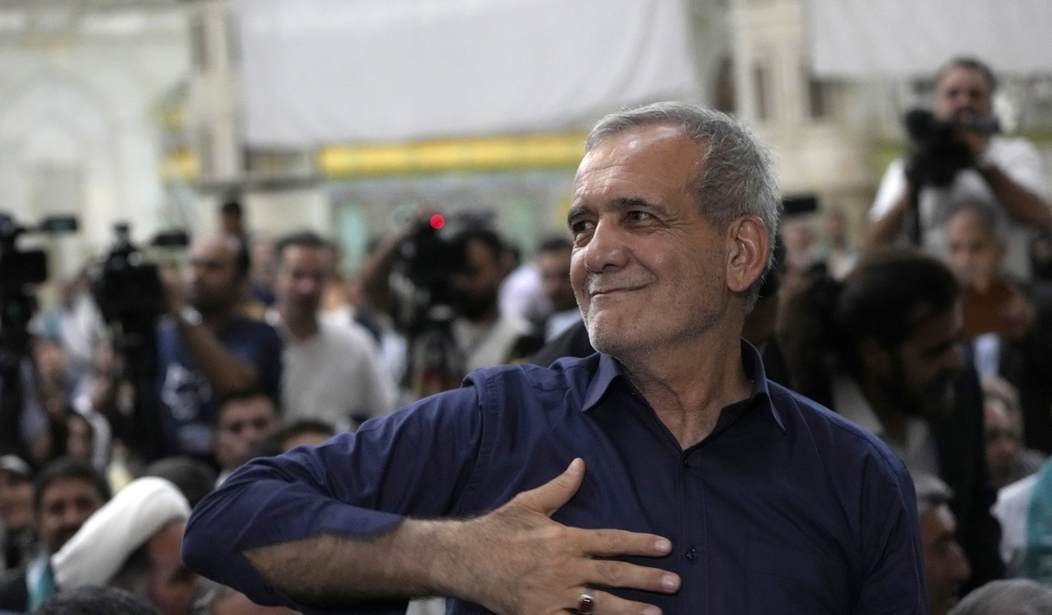The idea behind the "Axis of Resistance" was that all of the terrorist groups funded by Iran in the Middle East would commit themselves to a kind of mutual defense pact. In case on of them was attacked by Israel or the US, they could all respond. But nearly a year after Hamas attacked Israel on 10/7 the Axis of Resistance isn't looking so hot.
The axis’s response as Israel has pummeled Hezbollah in Lebanon in recent weeks — killing many of its commanders and assassinating its leader — has so far been feeble, suggesting that the axis is weaker and more fragmented than many in the region had expected and that Iran feared that widening the war could cause Israel to turn its firepower on Tehran.
“The so-called axis of resistance from its very beginning was more or less a propaganda fiction created to enhance the prestige of the Islamic Republic,” said Ali Alfoneh, a senior fellow at the Arab Gulf States Institute in Washington.
Hezbollah was considered the leading Iranian proxy against Israel so the death of Hasan Nasrallah has shaken up the leadership of the other groups.
Mr. Nasrallah also forged personal ties with the other groups’ leaders, serving as an adviser and role model.
That is why Israel’s swift series of attacks on Hezbollah over the last two weeks — detonating thousands of its pagers and walkie-talkies, killing many of its top commanders and assassinating Mr. Nasrallah with huge bombs south of Beirut — have shaken the other members of the axis so badly. They seemed to have been unprepared for the possibility that Hezbollah could suffer such crippling losses.
The thought seems to have been that Nasrallah and Hezbollah would eventually deliver some payback for the losses suffered by Hamas in Gaza. But now Hezbollah has been demolished in a matter of weeks which really leaves only the Houthis to make trouble.
As for Iran itself, it seems to realize its only move is to stall for time. The country's new president spoke at the UN last week and basically said it wanted to de-escalate.
“The Islamic Republic of Iran seeks to safeguard its own security, not to create insecurity for others. We want peace for all and seek no war or quarrel with anyone. We seek lasting peace and security for the people of Ukraine and Russia,” Mr. Pezeshkian said.
Mr. Pezeshkian’s speech was unusually reconciliatory in tone and words. In the past, Iranian presidents have used the global platform of the Assembly to project defiance, and have threatened to take revenge on American presidents and denied the Holocaust in their speeches.
Instead, Mr. Pezeshkian extended an olive branch to Iran’s Western adversaries, with the exception of Israel. To what extent his rhetoric will match Iran’s actions remains to be seen.
This is of course a lie. Iran always seeks to create insecurity for others. But the fact that Iran feels the need to play nice even as its proxies are being demolished by Israel is an indication of how vulnerable they are feeling. They appear genuinely unsure what to do next.
Since Mr. Nasrallah’s death on Friday, the commanders of two armed groups in Iraq have told The New York Times that they had received no instructions from Iran on how to respond. Speaking on the condition of anonymity so as not to anger their patron, one said that everyone was still in shock at Mr. Nasrallah’s killing.
I suspect there's a religious component to this that isn't really translating in secular US news outlets. Yahya Sinwar, the leader of Hamas, is a true believer. Other Islamic terrorist groups are run by true believers. They really think God is on their side when they murder Israeli civilians. So when an entire terror group's leadership is wiped out in a matter of weeks, it isn't just a military crisis it's a crisis of faith as well. If Iran is stunned right now, that is part of the reason why. They lost Soleimani. They lost Nasrallah. They lost Haniyeh. They will lose Sinwar one day soon. They are losing.
Meanwhile, Bibi Netanyahu is doing better in recent polls than he has in a full year.
On October 7, Israeli Prime Minister’s Benjamin Netanyahu’s self-styled image as “Mister Security” seemed irrevocably shattered by the deadliest day for Jews since the Holocaust. The Jewish homeland and its leader had failed to protect the people. How could he possibly survive?...
A poll released Sunday by Israel’s Channel 12 showed that Likud would win 25 seats were elections to be held today, making it the largest party. Netanyahu enjoys 38% support, according to the survey.
“The regional confrontations are good for Netanyahu,” veteran pollster and analyst Dahlia Scheindlin told CNN. “They seem quite clearly to be the contributing factor to his recovery.”
From Iran's perspective, none of this is going according to plan. No wonder they are stunned and unable to respond.








Join the conversation as a VIP Member